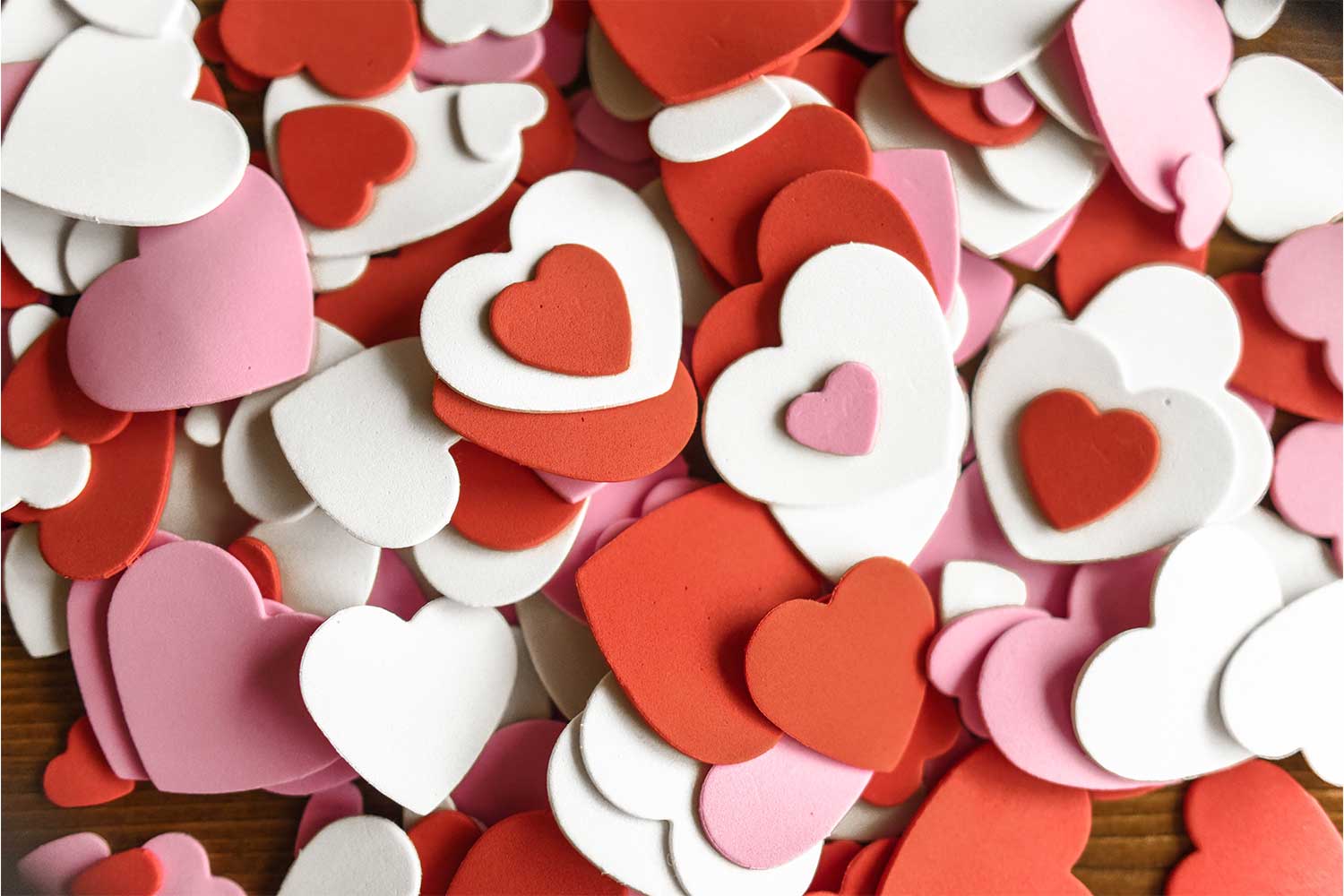Skip the Romance, Save the World
Why invest in the greeting-card industrial complex when you could be championing important causes?
Back in the fall, as I was working toward launching Asparagus, I had a great idea for an article. It would be called something like “The World According to Kap,” and would paint a picture of the better world Colin Kaepernick was working to build using the 1 million dollars’ worth of charitable donations he made over the course of 2017. I tucked the thought away in my Awesome Story Ideas file, and went back to writing my business plan. Y’know, first things first.
A few weeks later, a more well-established publication (Asparagus being a not-yet-established publication at that point) ran essentially the exact article I’d imagined. And it was a good article. It really didn’t need a do-over. So, I moved the thought to my much larger Stories I Wish I’d Published file, and turned my attention back to getting this site off the ground. You win some, you lose some. Never really expected to lose some to Sports Illustrated, but there you go.
One part of that idea just wasn’t ready to be filed away for good, though. In January, I was watching TV when I was struck by a desire to write a similar (if goofier) article: a guide to making the world a better place as inspired by a different pop-culture phenomenon. Not our era’s quintessential activist athlete, but a Crazy Ex-Girlfriend song. Specifically, “Without Love You Can Save the World.”
If you’re resisting the temptation to watch that video (and really, you should just succumb), the song depicts the show’s protagonist Rebecca Bunch and her friends crooning about all the world-improving things she could have done with the time she invested obsessing over romantic love. The song is silly, but the causes she name-checks aren’t.
So, in the spirit of International Singles Awareness Day (or whatever Catholic saint’s day the rest of y’all are celebrating today), I give you:
Rebecca Bunch’s Love-Free Guide to Saving the World
I could have used that time to cure leukemia.
Ok, some of the things she proposes are probably best left to the professionals, and this is definitely one of them. Don’t break up with your boo to cure leukemia unless you’re an actual scientist (in which case, Boo, bye). But even if most of us aren’t going to cure leukemia, it wouldn’t hurt to read up on what the professionals are doing. In the time I recently saved not making romantic Spotify playlists, I read about two large grants awarded to UC San Diego scientists in December to fund treatments based on their pioneering stem cell research.
I could have used that time to clean the seas.
Ok, this is one that we definitely all can (and must) actually take action on. Just this week, scientists have reported that micro-plastic pollution is present in even the most remote areas of the ocean. As a refresher, micro-plastics are “small plastic particulates below 5 mm in size.” They can be created through the erosion of larger plastic objects exposed to the environment (say, car tires), but are also intentionally created as synthetic fibres used to make clothing. (If your love-free lifestyle has freed up time to seriously geek out about micro-plastics, this report from the International Union for Conservation of Nature [IUCN] is pretty exhaustive.)
To do our part to reduce the plastic going into the ocean, we can all:
- eliminate as much plastic as possible from our everyday lives (with familiar strategies like reusable shopping bags, water bottles and coffee mugs, but also bringing reusable containers to our local bulk section, or shopping at zero-waste grocers where they exist). If you want to get serious about living plastic-free, check out My Plastic Free Life for more ideas.
- stop purchasing clothes made from synthetic fibres, and take action to encourage industry to stop making them. (The Story of Stuff has a multi-pronged campaign you can participate in.)
- launder synthetic-fibre clothes we already own with a product like the Cora Ball or Guppyfriend bag, which both claim to capture microfibres that are released in the wash so they don’t flow to the ocean from our washing machines. (These products are something Asparagus will definitely be researching for a future article, but for now I only know what they say about themselves. So, recommendations offered with a grain of salt.)
And, while stopping the flow of plastic into the ocean is an important step, we also still have our work cut out to remove the plastic that’s already in there. The Ocean Cleanup is an innovative project aiming to use new technology to reduce the Great Pacific Garbage Patch by 50% by 2020. They plan to deploy their first cleanup system later this year, and can accept tax-deductible donations from the Netherlands and the US. Since you’re saving money on roses that just wilt anyway, why not give some of it to them?
I could have taught some teens awareness of bulimia.
Another one probably best left to the pros. Or at least people with personal experience of eating disorders. For the rest of us, there are interesting research developments to read about in the time we’re not using to stalk that hottie from the gym on Instagram. The National Eating Disorders Association in the US announced some worthy grant recipients in December, including two tech-focused approaches: one developing a mobile app to track treatment outcomes, the other using virtual reality. Sure beats online dating.
I could have saved the pandas, whales, and bees!

First, pandas. Good news: giant pandas are faring slightly less badly than they had been in recent decades, and are now rated only vulnerable by the IUCN, instead of endangered. They’re hardly out of the woods, though, so if you want to use the money you’re saving on chocolate to save the pandas, the World Wildlife Fund will gladly help you do that.
Next, whales. It’s possible you’ve read this far and are thinking: “Jessie, can’t I have love and save the world?” The answer is probably not, but if whales are your thing, there is one way you can attempt to do both. British Columbia’s southern resident orca population is under serious, imminent threat due to inaction on the part of the Canadian government, and its approval of Kinder Morgan’s proposed Trans Mountain Expansion pipeline to transport bitumen from Alberta’s tar sands to the BC coast.
In the ongoing battle between the two western provinces, the BC government recently announced a plan to reduce bitumen transport until further research can be done into spill mitigation, and Alberta retaliated by announcing a ban on BC wine. So, if you’re determined to celebrate couplehood today, but also want to save the whales, you can reduce the pressure Alberta is putting on BC by toasting your love with a glass of Okanagan pinot. (This should be straightforward for Canadian readers, but Americans might need a hand. You can order BC vintages online, but if you need to pick up a bottle for tonight, you might be able to find one with the help of this list from Wine BC.)
Finally, bees. In case you needed reminding, scientists at UC San Diego released a report last month about just how important bees are to our ecosystems. If you decide to opt for bees over baes (and you should), Popular Science has some suggestions at various levels of difficulty. To go the planting-native-wildflowers route, the Xerces Society can help you figure out what to plant in your area.
…then suddenly the lakes have all gone dry, and it’s all your fault
Kinda true. The reasons lakes disappear or see water levels drop dramatically vary: climate change is a big one, so are irrigation and urban water consumption. So, skip the champagne in the hot tub, use less water around the house, cut down your carbon footprint, and reduce your consumption of high-irrigation crops grown in drought-prone areas (like California almonds, pistachios, rice, and dairy).
Conserve your mental energy, to research conserving energy.
Actually, you can pretty much just go straight to the “conserving energy” part of that lyric. The internet is awash in lists of ways to conserve energy, and if you’re reading this article odds are good you already practice a bunch of them. However, once you have a number of energy-saving habits comfortably incorporated into your lifestyle, it’s usually possible to add more.
I recently went through a list created by UK energy supplier OVO, and found a number of new strategies I’m going to adopt around the house. Letting love into your icy heart won’t help the planet, but it turns out defrosting your freezer regularly will.
Don’t raise hell, raise money for local schools, now that you’ve got time.
To be honest, I have mixed feelings about this one. Public schools are definitely underfunded in lots of jurisdictions, and fundraising for them is a not-unreasonable short-term solution to that problem (to that end, here are some ideas from Education World). Big picture though, our time is probably better spent on advocating for public investment in education and electing candidates running on strong school-funding platforms than racing goldfish, delightful though that sounds. (If you’re thinking a goldfish race sounds like an adorable meet-cute, you’re reading this article wrong.)
Use that leash to walk rescue dogs.

Rescue dogs need walking! And as long as you pick the weird-looking ones, you’re probably safe from having attractive strangers come up to talk to you while you’re doing it. Petfinder can help you find local shelters you can approach about volunteer opportunities.
Love is blind, but without love, you can actually help the blind!
The Canadian National Institute for the Blind has a database of opportunities to for volunteering with the blind in local communities. I couldn’t find an equivalent resource on the American Foundation for the Blind site, but they do have plenty of other suggestions for taking action. If you’re one of those people who believes in love at first sight, this might be a particularly valuable way of spending your time: save the world and shatter your own naive delusions!
So, there you go. Dozens of planet-saving things you could do with your time and money that aren’t contributing to the greeting-card industrial complex. I don’t think I could put it better than “forget who you did, think about what you can do,” so I’m not even going to try. Now, for a glass of BC wine.
